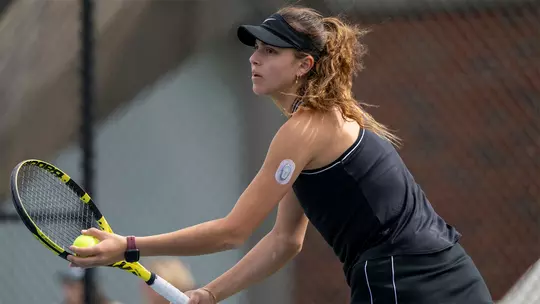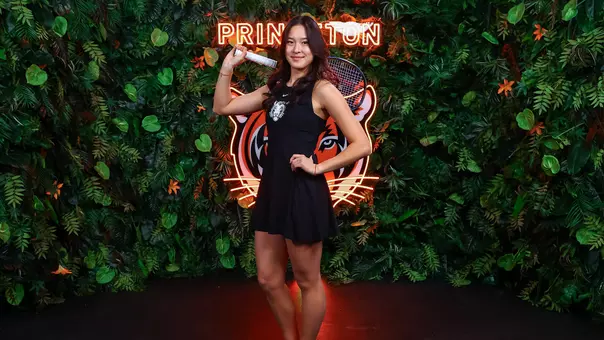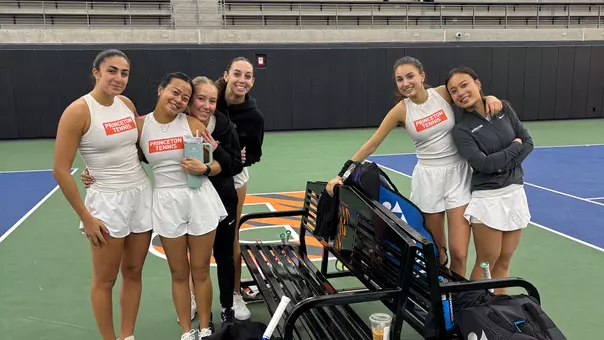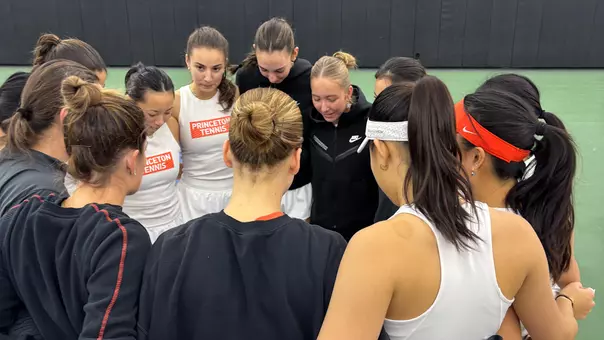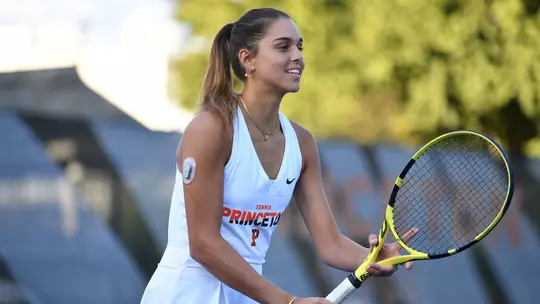
Life Changing, Not Limiting
Leena Bennetto's Tennis Journey as a Type 1 Diabetic
11/1/2023
Something felt off. Her energy was depleted, and her thirst became immense. Breaking point came when she could no longer see past the net.
Playing in a tournament on Vancouver Island, a 10-year-old Leena Bennetto, now a junior on the Princeton women’s tennis team, was forced to retire during a match for the first and only time of her career. Despite making it through the first few matches of the tournament, she had lost weight and struggled with her vision. She felt more tired than normal. Throughout the week she had been pestering her mom about having tennis ball fuzz in her eyes. In the weeks leading up to the tournament, however, she felt fine.
Immediately following her retirement, Bennetto and her mom, Dimple, took the ferry back to Vancouver and went straight to an optometrist. In the moment her greatest fear was having to wear glasses like her brother, Ryan, as the siblings already bore an uncanny resemblance. After the optometrist she went to an Emergency Room, where would receive a piece of life changing news.
Bennetto was informed she had Type 1 diabetes.
Her family was highly emotional upon receiving the diagnosis. The first person to call her was her coach from the Tennis Canada Vancouver Center, Oded Jacob, which meant a lot. He encouraged Bennetto, telling her that this condition was not going to hold her back, that she had a desire that was in the top percentile and that there were other athletes who had done it.
“If there was ever a good time to be diagnosed with diabetes, that was probably it for me,” said Bennetto. “I was young enough where I didn’t have a concrete sense of myself and how my life was supposed to be. I had only just gotten into tennis, which has become my whole life. It wasn’t hugely life-altering. Young kids are resilient and adaptive, I just rolled with it.”

Type 1 diabetes is a chronic condition where the pancreas makes little or no insulin, a hormone the body uses to allow glucose to enter cells to produce energy. Factors such as genetics and some viruses can cause Type 1 diabetes and despite years of research, there is no cure. To prevent complications, treatment is focused on using insulin, diet, and lifestyle to manage the amount of sugar in the blood.
The condition has not held Bennetto back at all. In fact, she believes it’s made her a better tennis player. She feels more aware of what her body needs in terms of nutrition and sleep, two key performance areas. Bennetto also feels that as an athlete you need resilience and the ability to overcome adversity, intangibles that she has honed through living as a diabetic.
Pre-Princeton, Bennetto won two ITF Junior Singles titles, five ITF Junior Doubles titles and competed in 18 different countries. She was ranked No. 1 in British Columbia in U14, U16 and U18, along No. 5 in Canada for U16 and No. 9 for U18. In the ITF World Juniors, Bennetto achieved a career-high ranking of No. 211. She helped Canada qualify for the Junior World Championships finals in Prostejov, Czech Republic, after helping Canada qualify in Mexico.
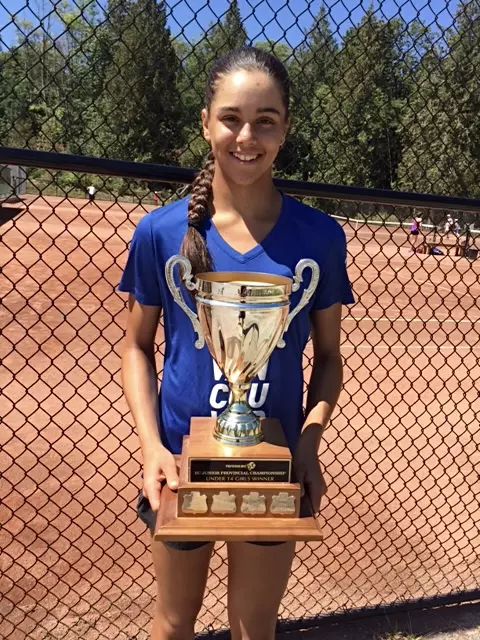
Since coming to Princeton, Bennetto has helped uphold the tradition of success that defines the women’s tennis program. She’s been part of teams that made it to the second round of the NCAA Tournament twice and have won two Ivy League titles. In the 2022-23 season she ranked second on the team in singles victories with a 17-10 record and excelled in the classroom, being named an ITA Scholar Athlete. The Tigers have been ranked as high as No. 23 in the nation during Bennetto’s time with the program.
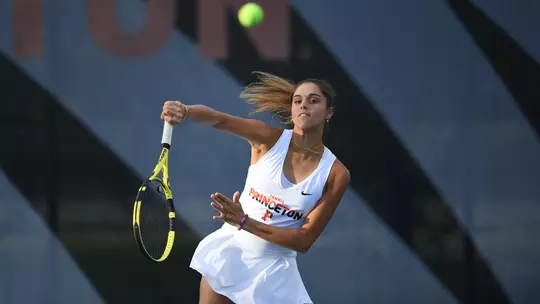
Bennetto’s journey to Princeton was assisted by a strong support network. Almost immediately after her diagnosis, her father, Murray, showed her a list of Type 1 diabetic professional athletes to let her know she could still pursue her passions and dreams. The list included Canadian hockey player Max Domi and former NFL quarterback Jay Cutler to name a few. While she remembers not seeing may women athletes on the list, just seeing others excel at sports meant a lot as doubts began to creep in about if she could accomplish her goals.
Diabetes and tennis have gone hand-in-hand for me. They’ve been equally as much part of my life.Leena Bennetto
Born in Hong Kong, Bennetto moved to Vernon, British Columbia at a young age. Her dad was a tennis player himself, playing college tennis at Miami (Ohio) before entering the pro ranks and moving to Hong Kong, who he would represent in the Davis Cup as both a player and a coach. Leena and her brother tried multiple different sports, but it was tennis they fell in love with. At age nine she started playing.
Showing elite talent at a young age, Leena was invited to train at the Tennis Canada Vancouver Center once a week when she was 10 before moving to Vancouver with her family to train full-time. Tennis Canada is the national tennis federation of Canada, an equivalent of the USTA. It has National Centers in Vancouver, Montreal and Toronto and has high-performance junior programs that aim to foster the next generation of Canadian tennis players. Bennetto was a resident for five months before receiving her diagnosis.
Her mother and brother made the move with her while her father stayed in Vernon for work, making frequent trips to Vancouver to be with his family. Given the amount of training required to develop into an elite tennis player along with the need to travel often for tournaments, Bennetto took high school classes online. In total she was there five years, an experience she was grateful for and acknowledges was a vital part of her tennis journey.

Coaching Bennetto throughout those years was a rewarding experience for Oded Jacob. At 10 years old he could see in her eyes how much she loved the sport and wanted to learn.
“She progressed very quickly despite her medical issue,” said Jacob. “She never made an excuse about it, never had to do things different or stop. She was very mature about it, didn’t hide it and managed it like an adult. She bravely kept her eye on the ball, continued to develop and didn’t let anything distract her. She became one of the top juniors in Canada by 15 and represented the country in the Billie Jean King Cup and ended up at an amazing school with an amazing program like Princeton. It was part of her mission.”
Along with producing great athletes, Jacob also values seeing those young athletes become great human beings with skills that help them navigate life’s peaks and valleys. He regards his time coaching and getting to know Bennetto as a privilege.
One of the challenges Bennetto has faced has been misunderstandings and delays with the security, so much so that they have become standard part of her travel routine. One instance, that Jacob was witness to, was the worst Bennetto ever had to deal with. Travelling with Team Canada for the World Junior Championships and Junior Fed and Davis Cup qualifying, Bennetto, Jacob and their team passed through a small airport in Campenche, Mexico. This was the type of airport with only one security line and a handful of gates. At the time, Bennetto was using an Animas Insulin Pump, which resembles a pager with some tubing.
“To be fair, if you weren’t familiar with diabetes and diabetes management, you wouldn’t know that it’s a medical device,” said Bennetto. “So, I was always being stopped in security because, one, my pump couldn’t be scanned, and two, my bag was always full of liquids, insulin, and needles.”
The language barrier proved to be a challenge here, of the limited security staff airport none spoke much English. While eventually Bennetto found a translator, much of what she was trying to explain was lost in translation. It was difficult to communicate that she could not take off her pump for an extended period so they could look at it and put it through and X-Ray machine. The older model pump would stop working if it went through an X-Ray machine, and she couldn’t remove her pump for more than a short while at a time. Typically, one had to shower and change the infusion (needle) sit. The pump was essentially Bennetto’s pancreas and asking her to remove it would be akin to asking someone to remove a pacemaker.
The maturity and level of calm Bennetto handled the situation with at such a young age left a lasting impression on Jacob.
“She handled it with such patience and understanding, she was so calm,” said Jacob. “She was so open about it, everybody admired it and thought she was completely normal.”
Along with the language barrier, unfamiliarity was also an issue. The airport security had never seen her pump was it was mostly used in the US and Canada, so there was suspicion was about Bennetto’s equipment. While she was forced to wait at security for over an hour, Bennetto was not particularly stressed. Even back then she was used to it and the team was not rushing.
Today, Bennetto’s airport routine has not changed, and she always factors in more time to get through security. Her pump relies on wireless communication so a full body scan may cause it to stop working, which is an unreasonable risk for her to take.
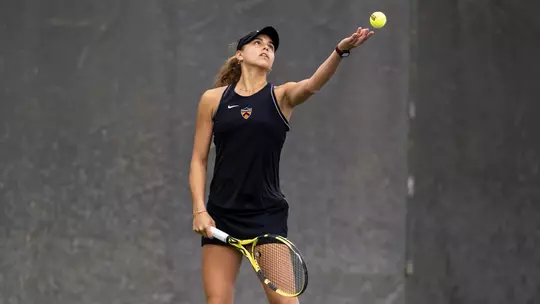
With the goal of being a pro, it was late 2019 when Bennetto started considering college tennis. After committing to Princeton, Bennetto would receive the Novo Nordisk Donnelly Scholarship from the USTA at the 2021 US Open. One of two award recipients, Bennetto received $10,000 toward her educational pursuits and got to take in a day of Grand Slam Tennis with Billie Jean King. The award is available to high school and college students who excelled academically and as tennis players and have strong leadership and community involvement skills. Named in honor of Tracey Donnelly Maltby and Diane Donnelly Stone, who along with their father, Bud Donnelly, all played Division I college tennis while living with the Type 1 diabetes. Tracey played singles and doubles at Iowa and received All Big Ten honors. Diane was a three-time All-American and 1987 NCAA doubles champion at Northwestern and was inducted into the 2022 ITA Collegiate Tennis Hall of Fame. Bud played singles and doubles for four years at Western Michigan where he won six individual Mid-American Conference titles.
For the past 18 years, the scholarship has been funded by Novo Nordisk Inc., a global healthcare company dedicated to helping people meet the needs of living with diabetes and other chronic diseases. Cecelia Health and Dexcom have also been partners in the program since 2019. Dexcom is a leader in transforming diabetes care and management by providing CGM technology to help patients and healthcare professionals better manage diabetes.
Initially, Bennetto thought that the award was only available to American players given it’s a USTA award. Eventually she discovered she was eligible, applied and became a winner. Living with Type 1 diabetes is not cheap so the financial award was greatly appreciated, and Bennetto was ecstatic to spend a day at the US Open with Billie Jean King.
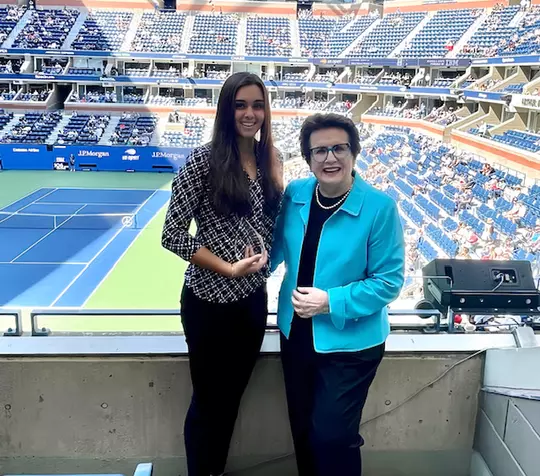
Meeting BJK was incredible, she’s such a fun person, has a fun personality and sense of humor. She’s so friendly. She’s always been a big inspiration to me, it was special to meet her and talk to her and have her say what I do is inspiring. It was an incredible moment.Leena Bennetto
Since the special day at Flushing Meadows, Bennetto has maintained a relationship with the Donnelly sisters and individuals from Dexcom.
While she is currently the only member of the Princeton women’s tennis team with Type 1 diabetes, Bennetto’s teammates have become a second family and Princeton a second home. All her favorite memories at Princeton have revolved around the team, and she considers herself lucky to have them as friends and teammates.
In 2021-22, her freshman year, the Tigers finished Ivy League play with a 6-1 record and got to raise the Ivy trophy at home. A 4-0 victory over Army saw the Tigers move on to the second round of the NCAA Tournament. As a sophomore in 2022-23, Princeton had a perfect 7-0 record in Ivy duals, this time hoisting the trophy at Dartmouth. The Tigers would again advance to the second round of the NCAA Tournament after a 4-0 sweep of Fordham. Bennetto and her teammates have had much to celebrate over her two seasons with the program.
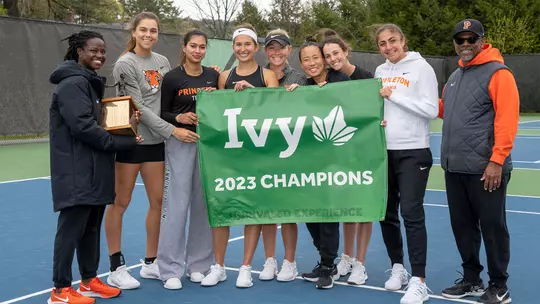
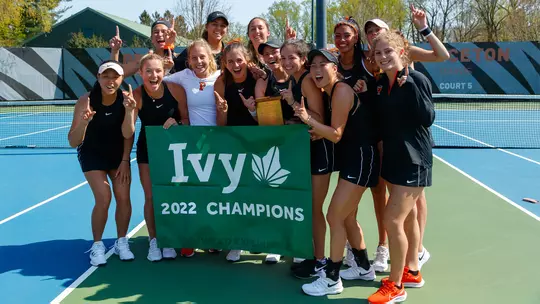
Prior to Princeton, Bennetto’s tennis career had been individual, such is the nature of the sport. She has fully embraced the team aspect of college tennis.
“Regardless of the result, competing and representing something bigger than you, having people who really care about you is special, especially in tennis,” said Bennetto. “Having this group of people who genuinely care about you, are routing for you and want you to do well. Competing beside them on the same team is special.”
The championships, the NCAA Tournament appearances, the match days, the team meals, and time spent together as teammates and friends will never get old.
Through all the success, Bennetto has shown a steely determination that she wasn’t going to be held back from anything. It hasn’t always been easy. There’s going out to train and play and having to stop because of being hit with the blood sugar. There’s wanting to eat something but being too high for it. She grew up quickly and was forced to become both responsible and independent. Bennetto realized early that she was going to have to live her life very differently and that she couldn’t just do things, she had to consider this whole other system every step of the way.
“I like to think of it as another part of my routine,” said Bennetto. “A lot of other athletes have rituals before they play or warmup and worry about eating and sleeping right. I worry about the same things but with a few extra steps. A lot of calculations, thinking and planning. I must be adaptive; no day is the same.”
After college, Bennetto aspires to fulfil a long-held ambition and turn professional. She feels that the next two seasons at Princeton will help her be best prepared, along with the pro tournaments she’s played in the past two summers. While she was committed to full-time in high school, competing in pro events both nationally and internationally, the uncertainty brought on by the COVID-19 pandemic made her reconsider going straight to the pro circuit. Bennetto considers going to Princeton the best decision she’s ever made, as it’s made her realize the value of taking more time to mature as a player and prepare for the professional level.
As time has gone on, Bennetto has embraced a more ambassadorial role for Type 1 diabetes and she envisions this becoming a larger part of her future, along with being a tennis pro. Helping others live with Type 1 diabetes has become a passion for Bennetto. The past couple years have seen her become more open about living with the condition, which she has thoroughly enjoyed. In 2020, she became a Dexcom Warrior and was featured in a commercial that aired on national TV in Canada. Dexcom describes a Dexcom Warrior as someone who lives powerfully with diabetes with the help of their own Decom CGM, someone with an indominable spirit who does what needs to be done, day after day, and someone who uses their voice to help other. Bennetto fits the description to a tee.
The passion she has for spreading awareness of the condition is evident, she loves when people notice the Dexcom on her arm and ask about it. Bennetto enjoys being the one to explain things, especially when the person asking is genuinely curious and seeks to gain a greater understanding.
What advice would she give to those looking to follow in her path?
“Obviously, there’s the physical aspect of Type 1 that’s very life-changing, experiencing the blood sugar rollercoaster and getting used to all of the supplies, management, technology and needles, which no kid likes,” said Bennetto. “The biggest change was mental for me. I’ve always been a perfectionist and it’s helped me in many aspects, tennis for one. It’s pushed me to aspire to be a great tennis player. Academically it’s helped me strive for the best, but it doesn’t work that well with diabetes. It’s a 24-7, 365-day disease. Expecting perfection every step of the way invites being let down and burning out.
My advice would be that it’s great to strive for perfection but to do your best with what you’re dealt with. Expecting perfection is exhausting with something that constant, especially when it feels like a reflection of yourself. Diabetes is such a big part of my life that it’s hard to divorce it from myself. Like tennis, for better or worse, I always think of myself as a tennis player. I will also always be a Type 1 diabetic, so it’s easier to let the ups and downs of Type 1 diabetes feel representative of your own successes and failures as a person. What I would advise is to be kind and understanding to yourself and that perfection doesn’t exist. There are so many extraordinary people doing amazing things with Type 1, especially now with the advancements in medicine and technology it opens so many possibilities and opportunities."
It is a big part of you, but it isn’t all of you and you can do whatever you dream of and aspire to be with it. It’s a self-manageable condition, its 100% manageable. You can do anything you want without being held back.Leena Bennetto
Bennetto also notes that Type 1 diabetes is often thought of as an invisible disease given that you wouldn’t know a person has it by looking at them unless you notice a CGM on their arm or see with them an insulin pump.
“It’s kind of a double-edged sword that you can see someone is dealing or struggling with it and it seems like a limitation or a weakness but if you don’t see any of that it must not be a big deal, it must be fine,” said Bennetto. “I would never think of my diabetes as limiting me in any way, but it is life changing. It is a big part of my life.”
When Bennetto notices other Type 1 athletes, she feels an instant bond with them due to how much they’ve shared.
Princeton women's tennis Head Coach Jamea Jackson has witnessed Bennetto's ability inspire others first-hand.
“At the Tennessee Invitational in October, Leena met a nine-year old tennis player who had been diagnosed with Type 1 diabetes,” said Jackson. “The young player was beaming from ear to ear as they spoke; you could see what it meant to her to see Leena succeeding on the court and in the classroom. Leena is an amazing young lady and truly inspires on a daily basis.”
Anyone living with the condition questioning is they can still fulfill their dreams need only look to Leena Bennetto.
